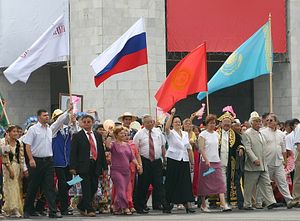For a decade straight, democracy has been in decline in Europe and Eurasia, Freedom House says in its recently released Nations in Transition (NIT) 2015 report. Much of the recent decline emanates from Europe, where democratization has not just stalled but “it is actively opposed by forces that are determined to see it fail.” In Central Asia, there has been decline as well, though many of the region’s states have been in the bottom of the rankings for some time.
The NIT ratings are based on a one to seven scale in each of seven categories (electoral process, civil society, independent media, national democratic governance, local democratic governance, judicial framework and independence, and corruption), with one representing the highest level of democratic progress and seven the lowest.
Uzbekistan and Turkmenistan have maintained their bottom-of-the-barrel rankings as “consolidated authoritarian regimes.” In every category, the two came in last — with matching overall scores of 6.93. This has been the case for the last decade. Turkmenistan has maintained its low score; Uzbekistan’s declined sharply after 2005’s Andijan massacre and has not recovered since. In last year’s country specific reports, Freedom House remarked that “survival, not politics, is likely to remain Uzbeks’ primary concern” and similarly that “liberalization in Turkmenistan is unlikely until a collection of social and cultural changes occur.”
Kazakhstan also maintained its score from last year, rating as a “consolidated authoritarian regime” with a score of 6.61. The country came in at fifth from the bottom out of the 29 countries ranked — an important point given the praise lavished on Kazakhstan by some after its recent presidential election. The 2015 NIT report notes that “Kazakhstan’s wealth and strategic cooperation have discouraged many European and other democracies from demanding accountability for its poor human rights record.” Kazakhstan tied with Azerbaijan and Belarus for the second-worst independent media scores — after Turkmenistan and Uzbekistan.
Tajikistan and Kyrgyzstan are the only two Central Asian states to see changes in their scores this year — both declines. Tajikistan remains in the “consolidated authoritarian regime” category like its neighbors. Declines in Tajikistan occurred in the civil society and judicial framework and independence categories, owing to increasing pressure on the practice of Islam in the country and numerous arbitrary arrests — many targeting members of the IRPT party. As the country marks 18 years since the end of its devastating civil war this coming weekend, peace has never seemed so fragile — the political and social arrangements that ended the war have disintegrated.
In Central Asia, Kyrgyzstan remains the only state to not be classified as a “consolidated authoritarian regime” but the outlook isn’t great — civil society has come under increasing pressure in the past year. While the country still has the region’s “most dynamic political system” in the past two years “a number of draft laws and an increase in intolerant groups advocating an ultraconservative Kyrgyz identity threatened the overall health of civil society.” Civil society is where Kyrgyzstan has been a beacon in the region, but the report’s authors are not overly optimistic about the 2015 outlook. Parliamentary elections later this year will likely provide the grounding for increasingly nationalistic rhetoric. The country report comments that “in an attempt to garner support, both the parliament and the president will continue to pursue populist agendas and may adopt laws limiting the rights of the LGBT community and the activities of the NGO sector.” In addition, Kyrgyzstan’s accession to the Russian-led Eurasian Economic Union is cause for concern.
Russia’s scores declined across the board, with 2014 representing the country’s largest score decline in a decade. Freedom House has harsh words for President Vladimir Putin: “This regime is not an eccentric or demanding ally; it is an enemy of peace and human dignity and an evangelist for a system of government that degrades and disregards fundamental human rights, even when not at war.”
The influence of Russia across Central Asia is clear, but what democracy advocates can actually do about it is decidedly murky. Two decades of development aid, investment, gentle cajoling, subdued comments, and patience have resulted in little to no democratic progress. Freedom House warns that the corruption can spread back into Europe: “Wealthy Eurasian autocracies more broadly — through their energy firms, lobbyists, investments, and offshore accounts — have a corrupting influence on European politicians and businessmen, who help to dampen criticism of such regimes’ abuses, forestall any punitive action, and weaken institutional safeguards in their own countries.”

































